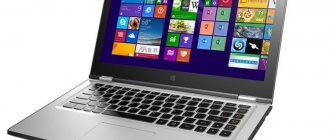The race for compactness continues. Since the middle of the last century, humanity has been constantly working to reduce the size of the computer. The first such machines hardly “climbed” into premises, but over time they were reduced to the size of a slot machine. A few more decades passed, and the PC design was improved to the sizes we are familiar with.
The dimensions of the monitors were reduced a little longer. However, replacing outdated CRT monitors with thin LCDs was also a matter of time.
However, modern desktop computers are still quite large and heavy. Therefore, mass production of analogues for PCs began: nettops, tablets, ultrabooks, all-in-one PCs and laptops . True, only the last two were able to become a full-fledged alternative to desktops. And today we will bring them face to face to understand the difference between them and decide on a future purchase.
So, what is better to choose in 2022 - an all-in-one PC or a laptop? A convenient mobile computer or a computer monitor for the home, without a bulky system unit?
Why is a monoblock an unpopular solution?
There is no need to talk about the popularity of the “monoblock” form factor in our time. The peak of their fame had passed, although the potential was good. All components in one device, saving work space, small size - at first this attracted buyers. Until all the “jambs” of such a decision began to emerge. Manufacturers have not increased the volume of supplies of monoblocks to the market, and right now the choice among models is small. And those that are on sale mainly represent the highest price segment.
“What happened that the form factor lost popularity?” - a person dreaming of buying an iMac will ask. The main reason was the initially strong heating of the iron and high operating temperatures of internal components . In addition to the processor, storage and video chip, the display matrix also suffered from heating. There were only 3 possible solutions to this problem:
- Build in an oversized cooling system, which would affect the size.
- Optimize energy consumption by reducing productivity.
- Create innovative but expensive heat removal systems.
And if for expensive products the 3rd option was acceptable, as Apple and Microsoft did, for example, then devices from lower price categories had to say goodbye to performance. Thus, if you buy neither an Apple iMac nor a Microsoft Surface, you will most likely get a simple “office” all-in-one PC that will perform at the same level as a very modest PC. It’s far from certain that it will handle your tasks, especially if it’s working in complex programs.
Computer for work
There are several directions in this segment. Everyone’s work is different: for some it’s typing and sending email (and solitaire, of course), for others it’s complex programming and 3D modeling processes. In the first case, there’s not much difference between what’s better – a computer or laptop, no. The main selection criterion in such cases is usually not the characteristics, but the price of the issue. In most cases, this characteristic shifts the balance of choice towards a desktop computer.
There are, of course, exceptions to the rules. These are mainly computers for accountants. Modern financial programs and banking clients are quite resource-intensive and it is necessary to choose productive machines to run them. Again, there is not much difference between choosing a computer or a laptop, other than the price for this category. Any computer or laptop with parameters slightly above average is suitable for an accountant.
A completely different approach for the second category, especially for working with video, image and visualization programs. Such software requires huge resources. If we talk about laptops, then you can immediately say no to anyone. Even the most expensive and powerful laptop will be inferior in comparison with a stationary unit
Another important detail in the choice will be the monitor. For working with visualization, the larger it is, the better, and this is another minus for the laptop.
Imagine what a laptop will look like with a top-end graphics card, which requires separate power and powerful cooling, and a 24+ inch monitor.
Power supply. For all this baggage of powerful components, appropriate power is also required. It is not always possible to make a powerful power supply compact and convenient for completing such laptops. High energy consumption requires appropriate dimensions and proper cooling.
Hence the conclusion - only a stationary PC. If we talk about the parameters, they are comparable to the previously reviewed computers for video games: a powerful processor, a video card, maximum RAM and a widescreen monitor.
Pros and cons of an all-in-one PC over a laptop
Well, one serious drawback - the high price of good monoblocks - has already been mentioned. But the form factor has enough disadvantages as it is. It will be almost impossible to upgrade an outdated model. The only thing that can be improved is to install an additional RAM stick. But not every model will provide this opportunity. The central processor, video chip and storage are hidden deep in the case, and they cannot be easily replaced.
On the other hand, all-in-one PCs take up little work space , even less than a regular laptop. They also have a larger screen , which is important for working in programs where there are a lot of elements and buttons. This is also a plus for multimedia - viewing any content will be much more enjoyable than on a smaller laptop display.
Advantages of desktop PCs
1 Ease of maintenance
Such computers are easy to maintain and it is much easier to find a broken one. To look into the system unit, you just need to unscrew the bolts and remove the cover. There is absolutely no need to remove the second one. After this, we take out the desired part. Regarding the laptop, in order to get to the required part, it is necessary to disassemble it almost to the last bolt (depending on what you decide to remove).
2 Cost of a simple computer
Also, the decisive factor when choosing a PC is its cost. For a desktop PC it is an order of magnitude smaller compared to a laptop. For example, my laptop has a 27-inch display. Can you imagine how much a laptop with such a screen would cost? You can see for yourself about the price, you just need to compare the same characteristics of these devices. The same compactness and mobility of a laptop are to blame for this.
3 Consistency of power supply
This is a huge plus for a regular PC. I connected the computer to the outlet and forgot. Of course, I do not mean those places where there are power outages. Because, despite all the advantages of a laptop, its battery may suddenly run out and you need to urgently look for another one.
Regarding a desktop computer, in case the lights blink, there are uninterruptible power supplies. Many of them can power a computer for a decent amount of time. I don’t know how it is in other cities, but in my house the light goes out no earlier than a month later and they repair it within an hour!
For whom is a monoblock better?
It will depend on your immediate tasks whether it is better to buy a laptop or an all-in-one computer. A monoblock is preferable if you:
- are used to typing text on a full-size keyboard, and not on a small laptop one;
- you work in programs for which a larger diagonal is more convenient;
- do not work in very resource-intensive applications;
- don't play games;
- you don’t have to carry your computer with you;
- spend your leisure time watching movies and videos.
Pros and cons of a laptop over an all-in-one PC
Laptops by their nature are designed for mobile users who use computer resources at home and at work, in the park and at a party, at the desk and in bed. Laptop computers are a minus in terms of performance and a plus in price due to their compactness, which again puts desktop computers in a more advantageous position. This is a regularity - reducing dimensions always forces you to make compromises.
Your laptop can cost $1,500 and at the same time be slow to play a more or less demanding game, or render a project in a resource-intensive application many times longer than it can be done on a PC. But such a computer can be easily carried with you anywhere, performing certain tasks in any conditions. Even if you are going on a long trip, the laptop will not take up too much space in your luggage. Thus, if, when choosing what is better to buy - a laptop or an all-in-one, you understand that you will use the device not only at home - the all-in-one is no longer necessary.
Computer for games
Based on the statistics of desktop computer purchases, the bulk are, of course, gaming PCs or “computers for children.” Although there are gamers who are no longer children, the championship still remains with them.
For such purposes, the choice should be approached more responsibly, since the gaming industry “felt freedom” and new products are coming out with requirements that exceed the requests of some NASS or ROSCOSMOS 10 years ago. This is a powerful power supply, a modern high-performance video card, and a monitor with the appropriate diagonal and resolution.
If you compare a gaming laptop or a desktop computer, then it is better to give preference to a desktop PC. This is due to better performance and flexibility in upgrades. Yes, the computer market offers a whole line of gaming laptops. But the software, including the same games, is updated so quickly that upgrading your device may be needed in the very near future.
And as stated above, it is much easier to upgrade a PC originally intended for such purposes than any laptop. Not only are laptop improvements limited to the minimum, but the process itself, without the proper skills to disassemble such equipment, can lead to a disastrous result - the breakdown of expensive equipment.
Who is the best laptop for?
To understand what is better - a laptop or an all-in-one computer for home, work, study, games and your other tasks, you should understand exactly what tasks will be assigned to the computer. Your best choice is a laptop if you:
- you often carry your computer with you to work, school, for walks, etc.;
- travel a lot;
- use a computer in bed;
- in your spare time you like to play games;
- you don’t have free space at home to accommodate a PC or all-in-one;
- let other family members (for example, a schoolchild or student) use the computer and take it with them.
What is cheaper, what is more expensive?
What is cheaper - a laptop or a candy bar? Let's do a little side-by-side comparison. The Lenovo AIO V530-24ICB monoblock model is very popular on the Russian market. In one of its inexpensive configurations (RUB 57,075), you can get an i3-9100T , 8 GB of RAM, 256 GB of internal SSD and a built-in Intel UHD Graphics 630 . We are looking for a laptop with similar technical data. The following models fit these parameters:
- 14″ HP 340S G7 (RUB 47,092);
- 15.6″ HONOR MagicBook X 15BBR-WAI9 (RUB 46,990);
- 15.6″ ASUS ExpertBook B1 B1500CEAE-BQ0387T (RUB 44,620), etc.
Technically, the difference between these laptop models and the specified all-in-one is only in the display diagonal - 14-15 inches versus 24, respectively. Of course, you can find laptops with the same data and more expensive than 57 thousand rubles, but we have no intention of overpaying, right?
Table
| Monoblock | Laptop |
| Designed for home use | Portable device |
| Large screens (from 18.5" to 27") | Small screens (11” – 18.5”) |
| Weighs about 5 kg | Average weight 2-3 kg |
| Works only from the network | Operates on mains and battery |
| Any standard keyboard and mouse can be connected | Built-in keyboard and touchpad |
| Must have a CD/DVD drive | Optical drive not available on all models |
| RAM from 2 GB | RAM preferably from 4 GB |
| More expensive with similar characteristics | Cheaper and sold in a wide range |
Does brand matter?
Let's say you have already studied all the pros and cons of laptops or all-in-one PCs, and have decided in favor of a specific form factor. Next comes the choice of brand. Perhaps it would make more sense to consider models from different brands, but almost all of us are accustomed to trusting markings and well-known names.
Apple is ahead of the rest in this regard. External luxury, stable operating system, no brakes or system glitches. They also have excellent displays and a well-thought-out ecosystem that allows you to synchronize many different devices with each other. Those whose budget allows them will most likely choose an iMac or MacBook.
Those who have a more modest budget can pay attention to the brands Lenovo, Asus, Acer and HP. All these companies produce quite good laptops and all-in-one PCs in different price segments. The reputable American company Dell also has its share in the monoblock market. Each company has been producing electronics for many years and confidently maintains its brand. If you have equipment from one of these brands, and it disappoints you, do not rush to hang all dogs on it - there is a place for defects everywhere. Especially if saving money was your main focus.











